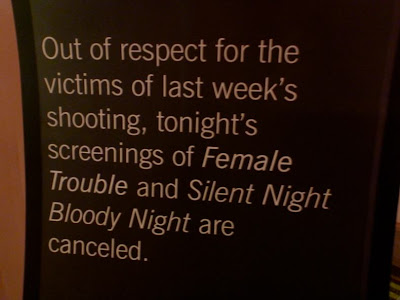Remember when movies used to get banned? When little old
church ladies wrote cranky letters over Deep Throat or when Britain refused to release The
Texas Chainsaw Massacre? If you think these
antiquated images are a thing of the past then check out the sign that greeted
me in the lobby of BAM Rose Cinemas in Brooklyn last Wednesday night:
 |
| BAM Rose Theatre Lobby Sign |
This was not a double feature. Both Female Trouble and Silent Night Bloody Night were individual screenings curated by BAMcinématek
Program Director Florence Almozini and cancelled “out of respect for the
victims of last week’s shooting,” presumably the tragic Sandy Hook school shooting of
December 14th.
So if the tragedy struck home, why not blackout the whole
theatre out of respect for the victims? Why target these two particular films
for cancellation?
Let’s look at the films themselves.
Firstly, Female Trouble (1974) is John Waters’ entry into the Juvenile Delinquent sub-genre of
exploitation cinema. The lead is played by Waters regular Divine, whose
character devotes herself to a life of crime. The film climaxes with a shooting
in a theatre and finally her death by electric chair. In BAM’s own words, Female
Trouble “crafts a moving piece of melodrama
about American society’s sordid underbelly.” This is true. It’s also a
pitch-black satire of criminal celebrity in the US, possibly the reason why it
was cancelled by BAM.
The second film cancelled was Silent Night Bloody Night, which is basically just a slasher movie about some lady
wandering around a mansion in the dark for an hour and a half. Not exactly an
allegory for current events but I suspect it was banned by BAM simply for being
violent. And banned it was.
According to Tim Dirks, column writer for AMC, the
definition of the word “Banned” is “the blocking of a film’s release… for
political, religious or social reasons.”
By its actions BAM broadcasts a giant message to both
filmmakers and theatregoers that films, which may be considered offensive to
the public, have a chance of being cancelled from their schedule. All this for
two 40-year-old films which are vaguely topical at best and in one case simply
a horror film.
I remember when Dimension Films (who made a bundle on the
Scream series) announced that the company would stop all production of horror
films in response to 9-11. This policy soon changed however as viewers’ demand
for horror films skyrocketed. According to Slant Magazine, the tragedy ushered
in “another golden age of horror” and independent genre releases doubled from
2003 to 2004.
Simply put, horror films act as a catharsis, a harrowing
memorial to the absence of life that reminds us to take stock of the life we
have. It is a smorgasbord of nightmares, which we as audience members can, when
the lights come on, pull on our coats and walk from the theatre unharmed- and
thankful.
Confronting terror in the abstract has widely documented
therapeutic effects in the real world. Successful treatment for Post-Traumatic
Stress Disorder, for example, includes cognitive behavioral therapy, a
controlled process of confronting the source of your trauma.
Continuing to treat genre films as though they were
disposable devalues them to the lower rungs of cinema. More worrisome is the
fact that by canceling a screening that is deemed too topical, BAM appears to
be joining a modern wave of conservatism which silences subversive thought.
Female Trouble is
too unsettlingly relevant, Silent Night, Bloody Night disposable. In either case BAM is reacting to a very
public tragedy by censoring one of the underground’s most celebrated auteurs
and reducing subversive ideas to collateral damage in the battle for the future
of cinema.
Are these two films offensive? By cancelling their
screenings BAM negates our ability to judge for ourselves.
Incidentally, the film they chose to replace Silent
Night Bloody Night?
The 1983 comedy, Trading Places.
